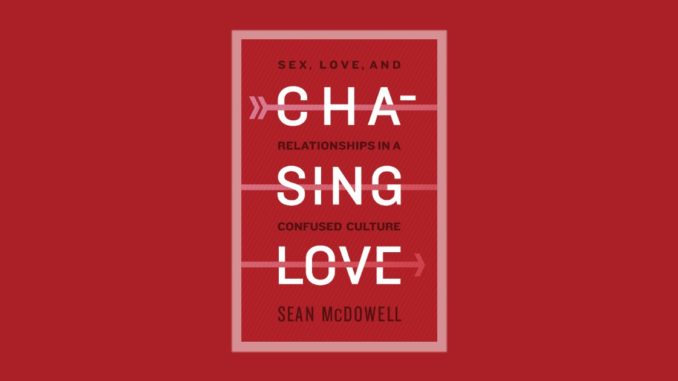
Published by B&H Publishing on December 1, 2020
Genres: Non-Fiction, Christian Life
Buy on Amazon
Goodreads

The music we listen to, the movies we watch—they're all telling us to keep chasing love, and that we'll finally be happy when we find it. But is love really all we need? The love that the world tells us to pursue is all about self, about following your heart’s desires. But what is the Christian worldview on love? When we follow Jesus, we realize that he invites us to reorient the focus of our lives, so instead of chasing love primarily for our own happiness, we are first and foremost to give love—to God and to others. In Chasing Love, Sean McDowell will invite readers into Jesus’ radical, upside-down approach to love, and in doing so, he’ll answer some of the toughest questions we’re asking about love today: How does Jesus speak to singleness?What does the gospel say about LGBTQ issues?Can sexual sin truly be forgiven?What if I’m not happy in my marriage?
Sex/Love/Dating books are always a bestseller in Christian markets, not because the people buying them are reading them, but because they’re giving them to their children/youth group hoping that a book will replace the difficult and awkward work of actually conversing with teenager about sex, love, and dating. That puts an unhealthy burden on the author of said book by asking them to do a job they shouldn’t have to do. Sean McDowell’s in a difficult position in Chasing Love, but it’s a position he put himself in by writing the book.
Part one of Chasing Love builds the philosophical foundations for an evangelical ethos of sexuality. The chapters are short, punchy, and meant for a young teen level audience. The good of this is that it is very introductory and foundational. The bad is that it tells rather than challenges. It assumes the reader is a tabula rasa when it comes to their thoughts/beliefs on sexuality and—as a youth pastor—let me tell you, that isn’t the case. McDowell isn’t necessarily wrong in any of his foundational teachings (I think he is in some areas, but it’s difficult to critique McDowell as he only states, rather than argues his case), but I don’t think that he ever goes deep enough in pouring the foundations to ensure that they stay rooted in the lives of our young people. And maybe it is that McDowell intends for his writing to be the jumping-off points for parents and pastors to do the hard individual work needed, but that’s often not the case.
Part two covers the purpose of sex, singleness, and marriage, with four chapters devoted to each. Again, the chapters are short and descriptive, aimed at imparting knowledge without necessarily rigorously defending it. This is most noticeable when McDowell writes that the primary purpose of sex is procreation. (What about infertility or same-sex relationships? asks the youth.) McDowell confusingly writes that sex that does not result in pregnancy is okay for opposite-sex behavior because it is “oriented toward procreation,” but that cannot be the case for same-sex couples. I’d like to explore that thought further because it’s not an argument I’d heard before, but McDowell just moves on. Take his word for it. That’s all. Next. It’s simply not going to pass the smell test for today’s youth.
Part three hits on the “hot button” issues: porn, cohabitation, divorce, homosexuality, same-sex marriage, transgender issues, and sexual abuse. McDowell’s expression of many of these issues lack nuance or grace (to the point that, in one case, he tells a story where he admits he lacked grace). Marriage, he says, must be saved at “all costs,” but never discusses biblical allowances for divorce. He says that staying in a bad marriage mirrors God, who was faithful to Israel even when they were not, but fails to mention that God divorced Israel (“I gave faithless Israel her certificate of divorce” Jer. 3:8). Further, McDowell’s discussion of homosexuality does not clearly differentiate between orientation and action and says like besides “The Bible says” without truly dealing with the arguments of those who interpret Scripture differently.
In the end, McDowell expresses a fairly classic evangelical view of sexuality—perhaps leaning more to the side that believes that sex is strictly for procreation—but he does so in a way that assumes his readers will agree with him. They don’t. Full stop. Chasing Love doesn’t respect its readers enough to assume that they’ve developed their own thoughts on these issues and fails to engage them at any reasonable level. It’s just not going to be a useful book for this generation. Even when I agreed with McDowell, It found myself cringing at the matter-of-fact and frankly arrogant way he made his case. Given that McDowell makes certain to express his view against same-sex relationships, it would not be too far off to say that the entire book was written simply to combat that view without seriously discussing the biblical text or the cultural milieu. It’s disrespectful to his audience and, frankly, will be counterproductive to his goals. It’s not just his message, it’s his tone. Since his tone won’t engage his intended audience and will instead push them farther away, I cannot recommend this book.
